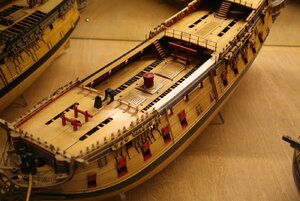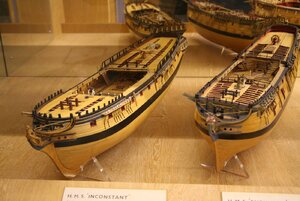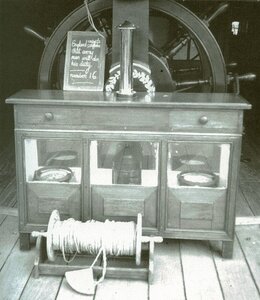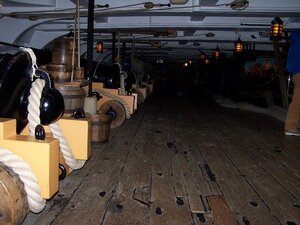Let's all stay on topic, please.
-

Win a Free Custom Engraved Brass Coin!!!
As a way to introduce our brass coins to the community, we will raffle off a free coin during the month of August. Follow link ABOVE for instructions for entering.
-
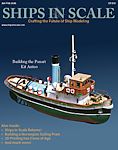
PRE-ORDER SHIPS IN SCALE TODAY!
The beloved Ships in Scale Magazine is back and charting a new course for 2026!
Discover new skills, new techniques, and new inspirations in every issue.
NOTE THAT OUR FIRST ISSUE WILL BE JAN/FEB 2026
You are using an out of date browser. It may not display this or other websites correctly.
You should upgrade or use an alternative browser.
You should upgrade or use an alternative browser.
Deck planking
- Thread starter Dave Stevens (Lumberyard)
- Start date
- Watchers 18
- Status
- Not open for further replies.
Oh, by the way. It seemed to go goofy after I asked about plank size on my crappy little build. Sorry, I really didnt know
and am still somewhat unsure how it was on the real ship. I'll go with the advice of what works for me.
and am still somewhat unsure how it was on the real ship. I'll go with the advice of what works for me.
I think that each model builder has their own preconceived notion of what the outcome should be. Actually, it may be considered that they are building what they want to see and present to others so "artistic freedom" should be acceptable as "the buck stops here" is what they present to viewers for the reaction of them and should not be given to a "sideliner" whose opinion is of their own and not the builder who for whatever reasons made their own decisions toward their own goals that need to be respected. Just a thought. PT-2Yup... great examples... and I did not know this until you explained it to me recently Dave and I thank you very much. The reason i stumbled upon this was while doing research for the Smithsonian project I am drawing plans for. The ship is quite large so the model will be in 1:64 scale. The Smithsonian plans indicate the deck plank widths were 3.5". At 1:64 scale this would be a touch over 3/64" planks... not only would planks this thin be impractical but when I drew them up in CAD they looked horrible. I shared my drawings with a couple friends and they agreed. In-fact, the Smithsonian artist who drew the plans himself even overscaled the planks in the drawing and indicated his planks were "for diagramatic purposes only".
So, let's take a look at a couple of common larger ship model kits. When we talk about frigates and brigs.... Say the Model Expo USF Confederacy or Brig Syren... both are in 1:64 scale and historically have about 4" planks as you show in your pictures above. That would result in the model having scale planks of 1/16" wide. But guess what? Both kits come with 1/8" planks and the plans in the kit are also drawn with 1/8" planks.
Why did they do this? 1) Because it is more practical for the model builder. 2) Because it is more aesthetically pleasing to the human eye.
Before I began modeling wooden ships I spent decades building plastic models. Part of that art is learning the skill of airbrushing and weathering. In this, a variety of techniques are used (shadows, highlights, dry brushing, picking out details, washes, etc) in an effort to "trick the human eye" into believing what they are looking at is a repesentation of a much larger object. ALL professional model builders do this including motion picture studios and professional photographers. If you simply paint the model the exact historical colors called for in the plans... the model WILL NOT look realistic.
Overscale deck planking on larger ship models is a great example of "looks" being more important than "historical accuracy".
I have met plenty of modelers in my life who demand historical accuracy over aesthetics no matter what.. damn the torpedos!! I am sorry to offend but I do not believe that, neither does the Smithsonian, neither does Ancre, and neither do professional modelers.
Harold Hahn took a lot of heat for placing artistic beauty over historical accuracy. I can understand why. While I appreciate the purist and I am a huge fan of history, I believe model builders have the right to build for "themselves" the way they want... not the way others dictate... historical or not. I call this "Builder's Choice". You will never see me criticize another model builder for building what they want. Beauty is in the eye of the beholder. This is also why I have never entered in any model competitions.
So if you want to build your model with planks as thin as a toothpick go ahead. Just don't tell me I can't have a hippocamp versus a hound... especially when it is actually a lion.
Sail on...
Look at those tree nails,,,,big single nails instead of doubles we often see.show me pictures of real decks
seems decks are not stark white like you see on models
decks come in different colors
deck planking seem to be narrow about the width of the average adult foot
deck planks curve and sometimes not
View attachment 172573View attachment 172574View attachment 172575View attachment 172576View attachment 172577View attachment 172578View attachment 172579
- Joined
- Aug 2, 2019
- Messages
- 211
- Points
- 278

These are modern day replicas,it does not mean that 250 years ago they look like thisshow me pictures of real decks
seems decks are not stark white like you see on models
decks come in different colors
deck planking seem to be narrow about the width of the average adult foot
deck planks curve and sometimes not
View attachment 172573View attachment 172574View attachment 172575View attachment 172576View attachment 172577View attachment 172578View attachment 172579
- Joined
- Aug 2, 2019
- Messages
- 211
- Points
- 278

One thing to keep in mind about the whiteness of holly, it will turn darker with time. What color I don't know and probably won't be around when it does.
- Joined
- Aug 2, 2019
- Messages
- 211
- Points
- 278

Smelly from what I know the number of fastner's depended on the width of the plank, but you probably already knew this. GaryLook at those tree nails,,,,big single nails instead of doubles we often see.
Reading Two Years Before the Mast frequently brings forth the watch crew in the morning holy stoning the decks until white and the washing the sand overboard. I didn't think that that daily maintenance brought out that color. PT-2Smelly from what I know the number of fastner's depended on the width of the plank, but you probably already knew this. Gary
Reading Two Years Before the Mast frequently brings forth the watch crew in the morning holy stoning the decks until white and the washing the sand overboard. I didn't think that that daily maintenance brought out that color. PT-2
[/QUOTE
I wonder as any of us now living and not seeing that past, except for some writers presentation, trustworthy or writers choice, can really know what the deck colors were other than speculation. How did a read source find the information and is the author vetted for their source being vetted in the chain of history?? PT-2
- Joined
- Aug 2, 2019
- Messages
- 211
- Points
- 278

Has far as what I read and research that is what I came up with. I read that they didn't use the stone every day but did give the deck a good cleaning with mops every day I believe. I have no ideal about the author sir. Only one way to be sure, but we will have to wait untill they invent a time machine. GaryReading Two Years Before the Mast frequently brings forth the watch crew in the morning holy stoning the decks until white and the washing the sand overboard. I didn't think that that daily maintenance brought out that color. PT-2
Last edited:
I speculate that the ship that the photos were taken was a dock-side visitors tour (HMS VIctory?) and without the required deck watch performing their daily chores. Probably a stretched out schedule for practicality is my guess. History I written by the victors so the question of frequency and results should probably be requested of that ships caretakers. PT-2Has far as what I read and research that what I came up with. Gary
- Joined
- Aug 2, 2019
- Messages
- 211
- Points
- 278

Yes, from your contemporary photos. Back in history the demands of the Captain and First Mate as well as type of service vessel, merchant or man-of-war could have had differing demands upon frequency and end results. I wasn't there back then to say what it was as we can only see what we see and accept today, possibly not an historical bit of research but current observation. As I have mentioned elsewhere, the appearance in your build is your choice and as historical or "artistic presentation to the eye" is yours alone as you desire. We on your sidelines, gunrails, should leave that up to you and appreciate your decision and outcome. PT2Well one thing is for sure good sir. I don't believe the Victory deck is white but a medium to light gray. View attachment 173018View attachment 173019
That is a great Channel on Youtube- Been following Leo's adventures since the first video and he has helped me understand a lot of the logic behind a boat's structure. I really enjoyed how he used the monster ship bandsaw to cut changing angles on the frame pieces.Dave there is a fellow named Leo, rebuilding the wooden ship Tally Ho which is a little over a 100 years old and he is replacing a lot of the old timbers in her. In fact you can call it a complete rebuild of her. Take a look sir, very educational. Its called the Sampson Boat Co and can be found on YouTube. He's very accurate and seems every thing is to scale.
I'm very keen to see how he planks the decks and the sides- next stage I think?
- Joined
- Aug 2, 2019
- Messages
- 211
- Points
- 278

Thank you sir and feel much as your self. What I try to do is give away info on what is what and if the builder uses that info fine and if they don't thats fine. Do i care how the builder build's his model, thats is up to him. If you have a question about something and if I can find it in my books, I will help you and with luck , if I can find it, will give it to you. Guess that some feel that offering help in that way they think your telling some one how they are post to build their vessel. O well. I do believe we on the same page I believe and thank you. Am I a expert sir, no just a student who like building and studying 17th/18th century ships. GaryYes, from your contemporary photos. Back in history the demands of the Captain and First Mate as well as type of service vessel, merchant or man-of-war could have had differing demands upon frequency and end results. I wasn't there back then to say what it was as we can only see what we see and accept today, possibly not an historical bit of research but current observation. As I have mentioned elsewhere, the appearance in your build is your choice and as historical or "artistic presentation to the eye" is yours alone as you desire. We on your sidelines, gunrails, should leave that up to you and appreciate your decision and outcome. PT2
Last edited:
- Joined
- Aug 2, 2019
- Messages
- 211
- Points
- 278

Thanks smelly, wasn't sure how to put the link in the post. Gary
I really like that link and tuned in to watch the framing and then planking planning which his math is beyond my mind at first viewing but could lead to an approach on larger planked models if the builder is serious about it. I'll just take a beginners approach and follow the instructions given with the canoe first and then Bluenose kit. It is amazing what the members of SoS find and provide for the curious. Thanks!!! PT-2That is a great Channel on Youtube- Been following Leo's adventures since the first video and he has helped me understand a lot of the logic behind a boat's structure. I really enjoyed how he used the monster ship bandsaw to cut changing angles on the frame pieces.
I'm very keen to see how he planks the decks and the sides- next stage I think?
- Joined
- Aug 2, 2019
- Messages
- 211
- Points
- 278

Hi JohnA. Like your self sir have been watching it from the first video and just enjoying them and learning from him. I like that bandsaw and just think if they had something like that in the 18th century shipbuilding would not have looked the same. I just saw the last videos and it took you into lining off the hull for the planks. Should be a good one.That is a great Channel on Youtube- Been following Leo's adventures since the first video and he has helped me understand a lot of the logic behind a boat's structure. I really enjoyed how he used the monster ship bandsaw to cut changing angles on the frame pieces.
I'm very keen to see how he planks the decks and the sides- next stage I think?
- Status
- Not open for further replies.





